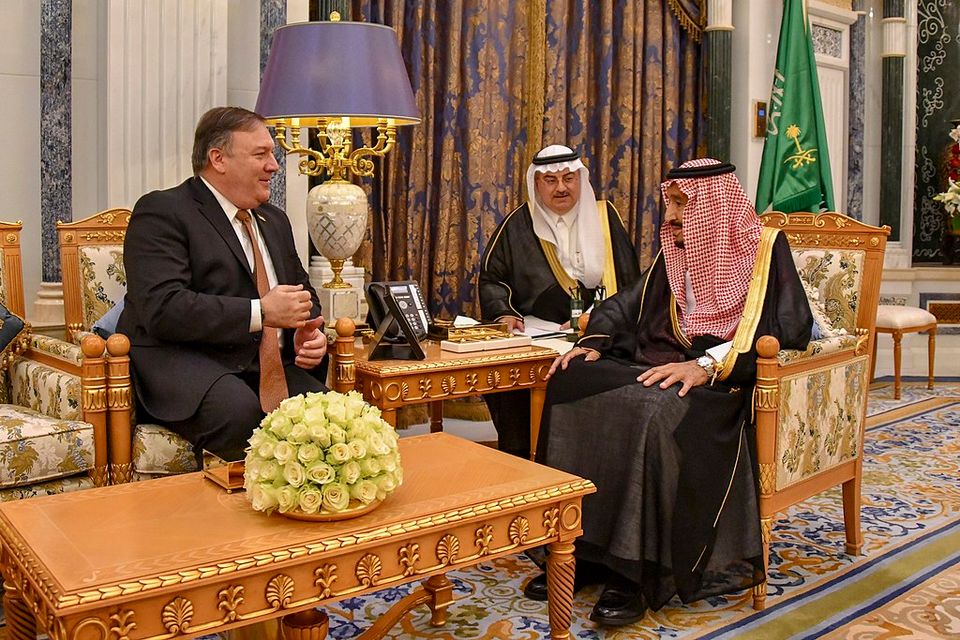
What the Disappearance of Jamal Khashoggi Means for Syria
US Secretary of State Mike Pompeo meets with Saudi Arabia’s King Salman to discuss the disappearance of Khashoggi. Photo credit: Wikipedia
It has been more than two weeks since the disappearance of Jamal Khashoggi, a Saudi journalist and prominent critic of the Saudi government and Crown Prince Mohammad bin Salman in particular. His disappearance sparked discussions in the media comparing the brutality of various governments throughout the Middle East. For example, some Lebanese journalists from state-run media outlets who defend Assad have responded to the Khashoggi incident by comparing the Syrian and Saudi governments, defending Syria for never having gone so far as to murder a dissident in an embassy on foreign soil. However, if the international community fails to provide an appreciable response to the incident, it communicates to states everywhere that they can target citizen dissidents abroad with impunity, which could empower Bashar al Assad to respond to Syrian citizens abroad. More generally, failure to respond would delegitimize human rights efforts across the Middle East, as it sends the message that states are willing to sacrifice human rights in the name of economic and political interests.
Saudi leaders maintain that they have no knowledge of what happened to Khashoggi in the Saudi consulate. However, media reports suggest that the Saudi government may be preparing to go so far as to admit that Khashoggi was accidentally killed in their custody. The US response to the incident has been mixed. A bipartisan group of US senators have threatened sanctions, and some have called for the resignation of Mohammad bin Salman. However, President Trump has defended the Saudi government, insisting that “rogue killers” are responsible for the incident.
The international community has responded strongly to Khashoggi’s disappearance, and ongoing coverage of the incident makes it unlikely that the Saudi government will be able to quickly move past the incident. However, it is unclear whether tangible repercussions will follow. President Trump has already made clear that he does not intend to halt arms deals with the Saudi government. Canada has similarly stated that it plans to continue with a contract with Saudi Arabia for armoured vehicles. Meanwhile, the European Union and UN Special Rapporteurs have called for an independent, international investigation, and other states, including the UK, Germany, and France have demanded the same, but have provided no indication of potential repercussions if the Saudis fail to cooperate. The international business community has responded firmly, with many high-level executives and businesses withdrawing participation from the upcoming ‘Davos in the Desert’ investment conference. However, many key participants currently maintain that they intend to participate.
In the absence of palpable consequences for the individuals who orchestrated and carried out the incident (or the Saudi government if it obstructs a meaningful investigation), Khashoggi’s disappearance communicates to the world that any state can persecute dissidents, both within its territory and abroad, without repercussions. The Khashoggi incident also illustrates a backsliding in the region, particularly with regard to activism and press freedom. In Egypt, a wave of arrests in May targeted peaceful activists, based largely on social media posts. In Iraq, two human rights activists were killed in July and September after helping to organize demonstrations in Basra over the lack of public services in the province. The targeting of activists is not limited to the Middle East; both Russia and North Korea have a history of extraterritorial persecution of dissidents.
Syria is also no exception. In February 2011, Lebanese security officials working for the Syrian embassy in Beirut facilitated the kidnapping of four brothers after they had been handing out leaflets which advertised protests at the embassy. Similarly, in May 2011, Syrian intelligence officials in Lebanon kidnapped Shibli al Aysami, a founder of Syria’s Baath party who, at the time of his kidnapping, was 89 years old. All four individuals were subsequently transferred to Damascus. It is no stretch of the imagination that the Khashoggi incident could embolden the Assad government to continue targeting citizens abroad.
If the international community brushes over Khashoggi’s disappearance and continues to engage with bin Salman as before, it will lose legitimacy when condemning the Syrian government, Iran, and others for mistreatment of journalists and activists. More broadly, the Khashoggi event highlights the need for the US and other states to take a regional approach to human rights issues in the Middle East. The collective advancement of human rights and democracy is compromised when the US and other states take a selective approach to human rights abuses. The international community failed to respond when Mohammad bin Salman arbitrarily detained members of his own family, detained the Lebanese Prime Minister, enticed Qatar to kidnap a Saudi activist and deport him to Saudi Arabia, despite his asylum status in Norway, and sanctioned Canada for their criticism of the arrest of activists, including Samar Badawi; if states had responded strongly then, it is unlikely that the Saudi government would have been emboldened enough to carry out the murder of a dissident on foreign soil.
This double standard has far-reaching implications for the Syrian conflict. While countries such as the US and EU member states are attempting to address the humanitarian crisis in Syria, the Syrian government is able to justify conditions by highlighting the international community’s failure to criticize the human rights records of other Middle Eastern states. Ignoring human rights violations of allies in the name of economic interests delegitimizes human rights efforts elsewhere and politicizes justice and accountability efforts more broadly.
SJAC joins other human rights groups in calling for the truth surrounding Khashoggi’s disappearance and demanding accountability for those responsible.
For more information or to provide feedback, please contact SJAC at [email protected] and follow us on Facebook and Twitter.